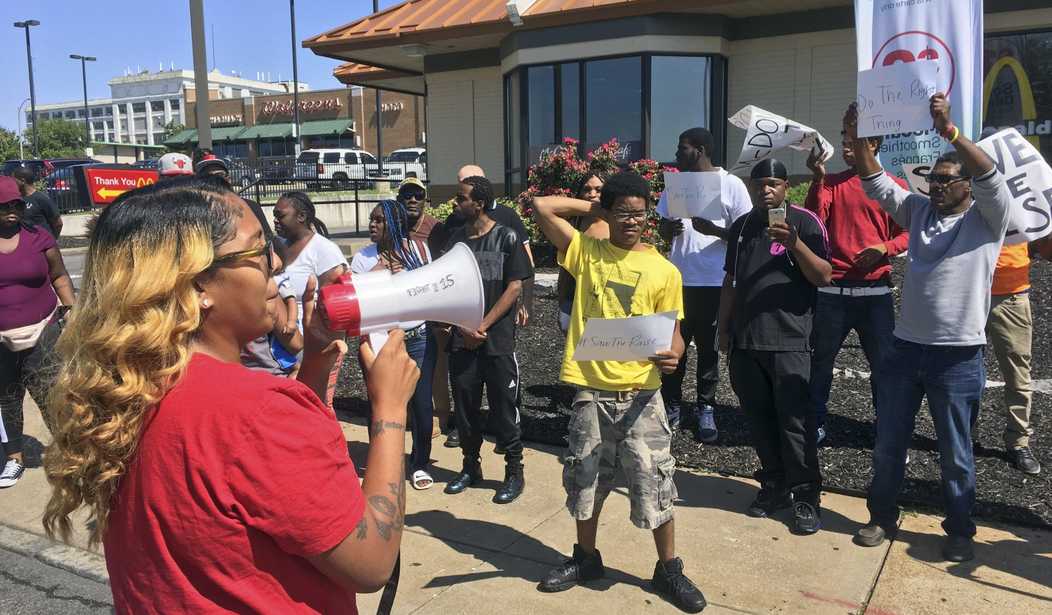Wanda Rogers is afraid the $2.30-an-hour raise she received May 5 will disappear on her next paycheck.
“If it goes back down, then I’m really gonna be in the hole,” said Rogers during a small protest earlier outside the McDonald’s restaurant in St. Louis where she works. “It put an extra $200 on my check.”
If the extra money does go away, it won’t be due to anything Wanda did or didn’t do at work.
The blame, if that’s the right word to use, rests squarely on the shoulders of the Missouri General Assembly, which pre-empted the St. Louis ordinance that boosted the city’s minimum wage from $7.70 an hour to $10 an hour.
But Missouri voters could wrest the power to raise the state’s minimum wage out of the hands of politicians in Jefferson City with a November 2018 ballot proposal.
“This campaign takes the power out of Jefferson City and gives it back to the people, where it belongs,” Richard Franklin, a janitor and Service Employees International Union member, told the Kansas City Star. “It’s up to us, the people, to take matters into our own hands.”
At the same time, another effort, the Save the Raise campaign, has motivated dozens of St. Louis business owners to stick with a $10-an-hour minimum wage despite that new state law that took effect today establishing a lower minimum wage for all of Missouri.
The St. Louis minimum wage went up to $10 hour after the Missouri Supreme Court agreed the city had a right to set its wage law.
However, a few days after the court ruling, the Missouri General Assembly approved a bill that set the statewide minimum wage at $7.70 an hour.
Gov. Eric Greitens (R) allowed the law to go into effect without his signature.
“I ran for governor to bring more jobs to Missouri. Our state needs more private sector paychecks and bigger private sector paychecks,” Greitens said in a statement. “Politicians in St. Louis passed a bill that fails on both counts: it will kill jobs, and despite what you hear from liberals, it will take money out of people’s pockets.”
Greitens also criticized members of the Missouri General Assembly who, he said, had “dragged their feet for months” instead of creating a “timely solution to this problem.”
The new state minimum wage law also pre-empted a voter-approved Kanas City, Mo., law that raised that city’s minimum wage to $10 on Aug. 24. Four days later, thanks to Jefferson City, it was “back to the future,” according to an editorial in the Kansas City Star.
“The new law disregards the economic realities facing low-wage workers in urban areas, setting the same minimum pay for workers in the smallest villages and the biggest cities,” wrote the Kansas City Star editorial board.
The news for those who work at more than 100 businesses in St. Louis is better. They will continue to be paid at least $10 an hour, as mandated by a city ordinance, despite the state minimum wage law, but only because their employers have signed the Save the Raise pledge.
“All employers still have the power to do the right thing and continue to pay the fair wage,” read a statement from Lewis Reed, president of the St. Louis Board of Aldermen.
Harman Moseley, who operates four movie theaters in St. Louis, said paying his employees $10 an hour instead of $7.70 would increase his payroll cost by at least $100,000. But Moseley also said he had no choice but to sign the Save the Raise pledge.
“People would be angry and then they wouldn’t do a good job and they’d be resentful,” Moseley told the St. Louis Post-Dispatch.
Moseley and other Missouri business owners would have no choice but to raise the minimum wage of their employees to $8.60 an hour in 2019 if the “Raise Up Missouri” ballot proposal campaign is successful.
Raise Up Missouri’s initiative would increase the minimum wage from $7.70 by 85 cents per year until 2023, when the state’s minimum wage would top out at $12 an hour.
“If it’s on the ballot, it stands a very strong chance of passing,” Jake Rosenfeld, a sociology professor at Washington University, told the Post-Dispatch.
However, Karen Wright, a retired nurse and SEIU member who collected Raise Up Missouri petition signatures, told the Kansas City Star that she wasn’t that optimistic.
“About one-third of the people were not enthusiastic about a minimum-wage petition,” said Wright. “They said low-wage workers need to get more skills or get a better job. And about two-thirds signed and said that even this isn’t going to be enough by 2023.”









Join the conversation as a VIP Member